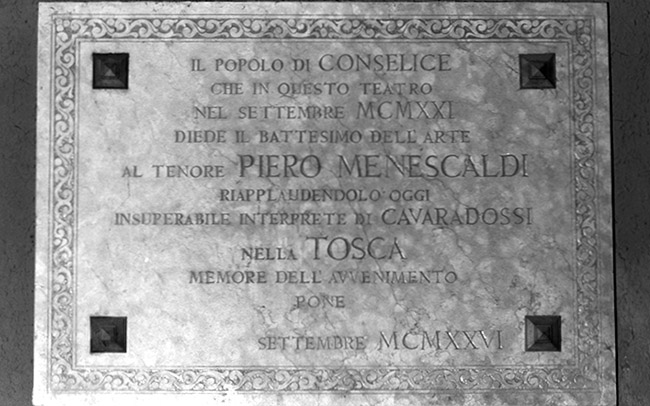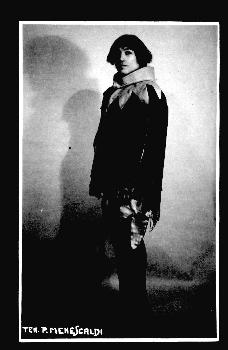Piero Menescaldi
27 March 1893 Milano – 23 January 1973 Milano
In RA format
Menescaldi studied voice in his native Milano with Giuseppe Russitano, and made his debut
in September 1921 as Duca di Mantova at the Teatro Sociale in Conselice. (The citizens of Conselice were so proud of this fact that
they placed a commemorative plaque at their theater's facade in 1936.)

For the next few years, he was busy at important as well as small Italian theaters: Catania, Lucca, Cremona, Como, Piacenza, Verona
(Teatro Filarmonico), Messina, Ancona, Modena, Bologna, Trapani, Marsala, Arezzo, Cagliari, Genova (Politeama), Trieste (Politeama
Rossetti), Venice (Teatro Malibran), Imola. In January 1925, he arrived at La Scala, which was to remain the center of his career
through 1933. During that time, he also returned to Bologna, Conselice (!) and Imola, and added new towns and theaters to his
curriculum: Ferrara, Varese, Busseto, Macerata (Teatro della Filarmonica), Mantova, Novara, Brescia, Pisa, Trieste (Teatro Verdi),
Bari (Teatro Petruzzelli), Palermo (Teatro Massimo), Ravenna.
In the years following his Scala tenure, he sang in Rome (Teatro Argentina). Sanremo, Florence (Teatro Verdi), Torino (Teatro Vittorio
Emanuele as well as Teatro Regio), Genova (Teatro Carlo Felice), Amsterdam, Den Haag, Treviso, at Covent Garden (Manon Lescaut,
1936), in Camogli, Casalmaggiore, Casale Monferrato, Monte Carlo, Como, Trieste, Verona, Pisa, Fiume/Rijeka, and Palermo (Teatro
Garibaldi) – always the same mix of first-class and provincial theaters. Other than that, he sang also opera on the radio. In
1940/41, he returned to La Scala once more and sang Achmed in Soleidas bunter Vogel by Max Donisch (a fervent Nazi, by the
way, so no surprise that he is completely forgotten): likely Menescaldi's stage farewell.
He had always sung unusual and rare repertory: Il Pergolese by Lamberto Landi, Severo Torelli by Ugo Bottacchiari,
Il diavolo nel campanile by Adriano Lualdi, Golitsyn in Khovanshchina, Italienischer Sänger (standard repertory
elsewhere, but definitely not in Italy), La bella e il mostro and Le astuzie di Bertoldo, both by Luigi Ferrari Trecate,
Ravel's L'heure espagnole, La campana sommersa by Respighi, La rosiera by Vittorio Gnecchi, Grigorij, Marouf,
Julien and Laca (all four not exactly frequent in Italy, either), La vedova scaltra by Ermanno Wolf Ferrari, Basi e bote
by Riccardo Pick-Mangiagalli, Il favorito del re by Antonio Veretti, Székely fonó/The spinning room by
Kodály, Scampolo b< Ezio Camussi, La falce by Catalani. But he also had a lot of more conventional roles in his
repertory: Alfredo (certainly his most-performed part), Duca, Edgardo, Enzo Grimaldo, Rodolfo, Turiddu, Loris, Puccini's des Grieux,
Maurizio, Paolo (in Zandonai's Francesca da Rimini), Pinkerton, Fenton, Cavaradossi, Rinuccio, Luigi, David and Don Basilio
(Le nozze di Figaro).
After his stage career, he taught voice in Milano.
Reference 1: the fantastic website of Roberto Marcocci;
reference 2: Kutsch & Riemens
Source for the plaque photo
I would like to thank Thomas Silverbörg for the recording.
Discography
Columbia, Milano, 1925 or early 1926
Lucia di Lammermoor (Donizetti): Fra poco a me ricovero D5270
Rigoletto (Verdi): È il sol dell'anima D5270
B850 Fedora (Giordano): Mia madre, la mia vecchia madre D9482, D5400
B851 Manon Lescaut (Puccini): Ah Manon, mi tradisce D9483, D5401
B852 La bohème (Puccini): Questa è Mimì D5402
B854 Manon Lescaut (Puccini): Ah! non v'avvicinate D9483, D5401
B856 Fedora (Giordano): Vedi, io piango D9482, D5400
B857 Cavalleria rusticana (Mascagni): O Lola D5402
BX14 La bohème (Puccini): Mimì è una civetta D17558, D16406
BX15 Cavalleria rusticana (Mascagni): Viva il vino D17558, D16406
Parlophon, Berlin, 29 September 1927
43080-2 La traviata (Verdi): Libiamo, libiamo B7901, 16802
2-84000 La traviata (Verdi): Dei miei bollenti spiriti unpublished
2-84002 Lucia di Lammermoor (Donizetti): Tombe degli avi miei unpublished
2-84003 Lucia di Lammermoor (Donizetti): Fra poco a me ricovero P8901, 22021, 59066
2-84005 Cavalleria rusticana (Mascagni): Viva il vino P8900, 22010
2-84006 Cavalleria rusticana (Mascagni): O Lola P8900, 22010
Parlophon, Berlin, 30 September 1927
43083 Tosca (Puccini): Recondita armonia B7900, 16801
43084 Manon Lescaut (Puccini): Donna non vidi mai B7900, 16801
43086 Madama Butterfly (Puccini): Addio, fiorito asil B7901, 16802
2-84002-2 Lucia di Lammermoor (Donizetti): Tombe degli avi miei P8901, 22021, 59066
2-84009 La bohème (Puccini): Che gelida manina unpublished
Fonotipia, Milano, 30 October 1930
Mo3311 Barcarola veneziana (Camerani) A168617
Mo3312 Loredana (Camerani) A168617
Sources: Robert Johannesson's www.78opera.com (alas defunct); Roberto Marcocci; Gesellschaft
für historische Tonträger, Wien
|

